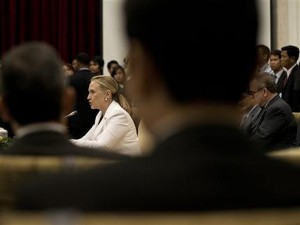PHNOM PENH, Cambodia — The Obama administration pressed Beijing on Thursday to accept a code of conduct for resolving territorial disputes in the resource-rich West Philippine Sea, a difficult US mediation effort that has faced resistance from the communist government. It has endeared the US, however, to once-hostile countries in Southeast Asia.
US Secretary of State Hillary Rodham Clinton will meet with Chinese Foreign Minister Yang Jiechi on the sidelines of the Association of Southeast Asian Nations’ annual conference, where several governments have expressed worry about China’s expansive maritime claims. Tensions have threatened to boil over in recent months, with a standoff between Chinese and Philippine ships and sharp disagreements between China and Vietnam.
China claims virtually the entire area and has created an entirely new city to administer it, sparking deep concern from rival claimants. The sea hosts about a third of the world’s cargo traffic, has rich fishing grounds and is believed to store vast oil and gas reserves.
“The United States has no territorial claims there and we do not take sides in disputes about territorial or maritime boundaries,” Clinton told foreign ministers gathered in Cambodia’s capital. “But we do have an interest in freedom of navigation, the maintenance of peace and stability, respect for international law and unimpeded lawful commerce in the West Philippine Sea.”
Asian countries should “work collaboratively and diplomatically to resolve disputes without coercion, without intimidation, without threats and without use of force,” Clinton added, according to remarks prepared for delivery later Thursday.
ASEAN’s 10 members announced earlier this week that they have drafted a set of rules governing maritime rights and navigation, and procedures for when governments disagree. But China is not a member of the group and hasn’t agreed to anything.
The ASEAN countries are presenting their proposal to China at this week’s conference in Cambodia’s capital, though Beijing will probably want to water down any language that ties its hands.
For the United States, the difficult diplomacy ahead could be a major test of the Obama administration’s efforts to “pivot” American power toward the world’s most populous continent.
Just speaking out on the subject already has helped the US deepen ties with Vietnam, and relations are warming with other governments in the region.
But countless meetings between American and Chinese officials have not led to progress on a lasting solution.
Various longstanding disputes among China, the Philippines, Vietnam, Taiwan, Malaysia and Brunei involve the area’s busy sea lanes, and many observers fear the complicated web of disputes could spark a violent conflict.
The standoff between China and the Philippines in the Scarborough Shoal off the northwestern Philippines began in April when the Philippines accused Chinese fishermen of poaching in its exclusive economic zone, including the shoal. During the tensions, both sides sent government ships to the area though both have since withdrawn vessels.
Vietnam has protested a recent announcement by the China National Offshore Oil Corp. opening nine oil and gas lots for international bidders in areas overlapping with existing Vietnamese exploration blocks. Vietnam says the lots lie entirely within its 200-nautical mile exclusive economic zone and continental shelf.


